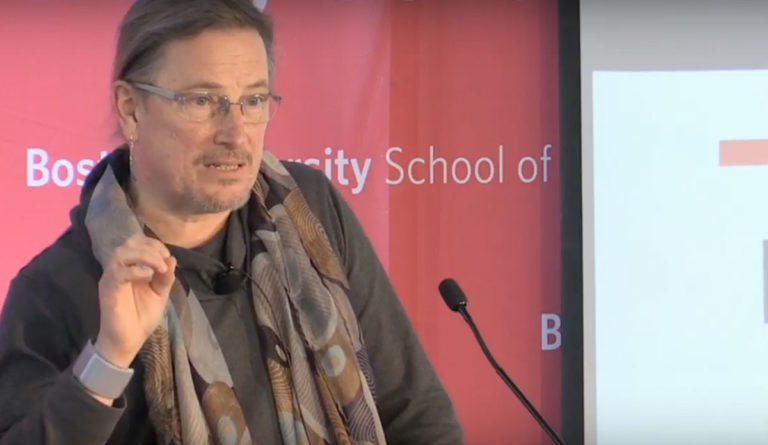Bobbi Taylor: Sex Work & Transgender Rights
PHP fellow Madeline Bishop talks with trans rights activist and educator Bobbi Taylor about the intersection of transgender rights and sex work.

Read Time: 5 minutes
Published:
As chair of the Massachusetts Transgender Political Coalition, Bobbi Taylor serves as a trans rights activist and public educator. Taylor is also a member of the Massachusetts State Commission on Unaccompanied Homeless Youth, the Fenway Board of Visitors, and the Massachusetts Sex Worker Ally Network, and has also served with such organizations as the Northwest AIDS Foundation, the Seattle Crisis Clinic, and the Boston Bisexual Resource Center. As a parent, partner, and community member, Taylor shares in the work of advancing policies and practices that embrace social justice, racial awareness, intersectionality, and feminist values.
Bobbi Taylor describes themself as gender-queer, non-binary, pan/poly/bi-sexual partner and homemaker, community advocate and trans rights advocate. This detailed self-description is important. At a symposium on commercial sex work in November 2017, Taylor stated, “I bring these aspects of my identity up because, visibility is important, and nowhere is this more challenging for us as a society than in the areas of gender and sexuality.”
PHP fellow Madeline Bishop was fortunate to sit down to talk with Taylor to talk about the intersection of transgender rights and sex work.
PHP: Could you tell me about your work and where it fits into this larger conversation about commercial sex policy?
Bobbi Taylor: I come to this primarily through the Massachusetts Transgender Political Coalition and through the issue of sex work in the trans community and the intersection of those two, and how any trafficking initiatives impact people I represent and the communities I represent. The other organization I’m involved with is the Massachusetts Sex Worker Ally Network, and that is an organization of allies—academics, researchers, therapists, and others—working to support sex workers in the work they do and in their communities. And we come from a “decrim” perspective.
PHP: And what does that mean, “supporting” transgender folks in the sex work industry? What does that support look like?
BT: So, there’s the whole issue of sex work being criminalized and people working in what is sometimes referred to as this “underground economy.” It’s very difficult to be an advocate for yourself if you’re in this work, which is why it’s really important to have allies who can speak for you—to help things move forward—to get us to a point where we can get more visibility. And I think of it kind of like what’s happened around LGBT rights where, back in the day when being “homosexual,” that automatically put you at risk of arrest and imprisonment.
MB: And I’m curious, how do you engage people who are working in the industry—to find out what it is that they want you to advocate for?
BT: I meet people through the circles that I travel in. I meet people in the trans community. I meet people in society at large who work in sex work. And you know, you form relationships and trust and you start hearing their stories. You know, we have these social narratives of people who work in the sex industry: you’re either trafficked or it’s not something somebody in their right mind would choose to do.
MB: That’s the perception.
BT: That’s the perception. It’s much like the way that being gay, lesbian, or bisexual used to be talked about. There’s us “normal folks” and then there’s “them”—there’s “the other.” So part of what I really work for is striving for those stories that bring these two together. So that we can put a face to people, in a sense, who are in sex work. Hear stories, understand why they’re doing what they’re doing. Demystify it. And overcome people’s prejudices and stereotypes.
The role of journalism I see is both getting the stories out—stories that shed light on why people engage in sex work, that help to demystify it—and to destigmatize it.
MB: What are some of the most common or outlying reasons that people get into sex work?
BT: There are a lot of reasons. A lot of times, we talk about [audible sigh] people in marginalized communities. For example, in the trans communities, there are very high rates of discrimination—barriers to employment, education, housing—that make getting jobs very difficult. Sex work for some folks is a way to get by day-to-day, put food on the table, pay their bills, sometimes even go to school, secure housing, things like that.
MB: The same reasons…
BT: The same reasons…
MB: …people get any kind of job, really.
BT: Exactly. Yeah.
MB: And specific to the transgender community, what are some of the challenges or barriers you see that you’re trying to overcome?
BT: One area where there’s some overlap is, for example, in the area of documentation. With the immigrant community, [lack of] documentation is a huge risk factor, and in the trans community, in a different way, documentation becomes a risk factor.
MB: How so?
BT: In terms of being outed, in terms of your identity as trans. So if I have documentation that identifies me as male, but I’m presenting as female. But I for example want to go into a shelter, I wind up in a shelter that’s not appropriate to the shelter that I identify with.
MB: There’s only a male dorm and a female dorm.
BT: Right. And that becomes even more problematic in correctional situations.
MB: And, my last question, what do you see as the role of journalism in advancing your work? And what do you see as the role of research in advancing your work? Public health research.
BT: The role of journalism I see is both getting the stories out—stories that shed light on why people engage in sex work, that help to demystify it—and to destigmatize it. I guess that’s really the word that I’m looking for—to destigmatize it. The role of research—I would love to see more research on attitudes around sexuality and sex work. And what the barriers are to decriminalization and to better understanding what we’re up against there, in terms of people’s belief systems and how to address that.
This conversation was lightly edited for length and clarity.
Feature image: Bobbi Taylor, speaking at the Boston University School of Public Health Dean’s Symposia “Understanding Commercial Sex Policy: A Global and US Perspective“



